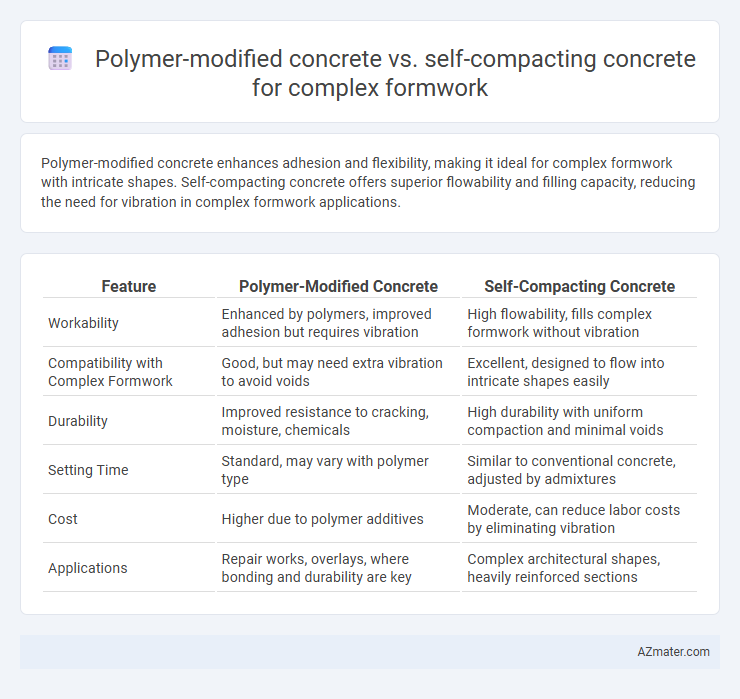Polymer-modified concrete enhances adhesion and flexibility, making it ideal for complex formwork with intricate shapes. Self-compacting concrete offers superior flowability and filling capacity, reducing the need for vibration in complex formwork applications.
Table of Comparison
| Feature | Polymer-Modified Concrete | Self-Compacting Concrete |
|---|---|---|
| Workability | Enhanced by polymers, improved adhesion but requires vibration | High flowability, fills complex formwork without vibration |
| Compatibility with Complex Formwork | Good, but may need extra vibration to avoid voids | Excellent, designed to flow into intricate shapes easily |
| Durability | Improved resistance to cracking, moisture, chemicals | High durability with uniform compaction and minimal voids |
| Setting Time | Standard, may vary with polymer type | Similar to conventional concrete, adjusted by admixtures |
| Cost | Higher due to polymer additives | Moderate, can reduce labor costs by eliminating vibration |
| Applications | Repair works, overlays, where bonding and durability are key | Complex architectural shapes, heavily reinforced sections |
Introduction to Advanced Concrete Technologies
Polymer-modified concrete enhances durability and adhesion through the integration of synthetic polymers, improving performance in complex formwork by reducing shrinkage and increasing flexibility. Self-compacting concrete offers superior flowability and segregation resistance, enabling it to fill intricate molds without mechanical vibration, which is critical for advanced construction techniques. Both technologies represent significant innovations in advanced concrete applications, optimizing structural integrity and surface finish in challenging formwork scenarios.
Understanding Polymer-Modified Concrete
Polymer-modified concrete (PMC) enhances traditional concrete by incorporating polymers that improve adhesion, flexibility, and water resistance, making it ideal for complex formwork with intricate shapes. Its superior bonding capacity reduces cracking and increases durability, ensuring high performance in structures with demanding architectural designs. Compared to self-compacting concrete, PMC offers greater toughness and chemical resistance, crucial for complex molds requiring enhanced material behavior under stress.
What is Self-Compacting Concrete?
Self-compacting concrete (SCC) is a highly flowable concrete mix designed to spread into place under its own weight, filling complex formwork without the need for mechanical vibration. It achieves high workability and stability through optimized proportions of fine aggregates, superplasticizers, and viscosity-modifying agents, ensuring uniform consistency and minimal segregation. This makes SCC ideal for intricate and densely reinforced structures, delivering superior surface finish and reduced labor costs compared to polymer-modified concrete.
Key Properties of Polymer-Modified Concrete
Polymer-modified concrete (PMC) exhibits enhanced adhesion, flexibility, and water resistance, making it ideal for complex formwork where high durability and impermeability are critical. Its improved tensile strength and reduced shrinkage prevent cracking and ensure intricate shapes retain their integrity during curing. The incorporation of polymers in PMC enhances bond strength with reinforcing materials, outperforming self-compacting concrete in applications requiring superior mechanical properties and long-term performance.
Distinct Characteristics of Self-Compacting Concrete
Self-compacting concrete (SCC) exhibits high flowability and excellent self-leveling properties, enabling it to fill complex formwork without the need for mechanical vibration, which reduces labor and cycle time significantly. SCC contains carefully balanced fines and viscosity-modifying admixtures to enhance stability, preventing segregation and ensuring uniform surface finish in intricate molds. Unlike polymer-modified concrete, which primarily improves adhesion and durability, SCC optimizes workability and homogeneity, making it ideal for complicated geometries and densely reinforced structures.
Workability and Placement in Complex Formwork
Polymer-modified concrete offers enhanced adhesion and flexibility, improving workability when applied to complex formwork with intricate shapes and curves. Self-compacting concrete excels in flowability and filling capacity, enabling effortless placement without the need for vibration, especially beneficial for dense reinforcement and tight corners. Both types optimize placement in complex formwork, but self-compacting concrete reduces labor and potential voids due to its superior self-leveling properties.
Strength and Durability Comparison
Polymer-modified concrete exhibits enhanced tensile strength and improved resistance to chemical attacks due to the polymer additives, making it highly durable for complex formwork structures. Self-compacting concrete (SCC) offers excellent flowability and uniformity without segregation, ensuring high compressive strength and consistent density throughout intricate molds. While polymer-modified concrete excels in flexibility and resistance to cracking, SCC provides superior workability and faster placement, both delivering robust performance in complex formwork applications.
Bonding Performance and Surface Finish
Polymer-modified concrete exhibits superior bonding performance with complex formwork due to its enhanced adhesion properties from polymer additives, resulting in reduced microcracking and improved durability. Self-compacting concrete offers excellent surface finish by flowing effortlessly into intricate molds without segregation or voids, ensuring high-quality aesthetics and smooth textures. While polymer-modified concrete strengthens the interface between concrete and formwork, self-compacting concrete excels in achieving defect-free surfaces in complex shapes.
Cost Implications for Complex Formwork Projects
Polymer-modified concrete increases material costs due to the inclusion of synthetic polymers, but its enhanced durability and adhesion reduce long-term maintenance expenses for complex formwork projects. Self-compacting concrete decreases labor costs by eliminating the need for vibration and allows faster placement, which shortens project timelines and reduces formwork pressure, ultimately lowering overall project costs. Choosing between these concretes requires balancing initial material investment against labor savings and durability benefits specific to complex formwork scenarios.
Best Use Cases: Selecting the Right Concrete Solution
Polymer-modified concrete excels in complex formwork due to its enhanced adhesion, flexibility, and resistance to cracking, making it ideal for structures requiring high durability and intricate detailing. Self-compacting concrete flows effortlessly into tight spaces and dense reinforcement without vibration, providing superior surface finish and uniformity in complex molds. Choosing between them depends on project priorities: polymer-modified concrete suits applications needing mechanical toughness, while self-compacting concrete is optimal for intricate formwork demanding flawless filling and surface quality.

Infographic: Polymer-modified concrete vs Self-compacting concrete for Complex formwork
 azmater.com
azmater.com